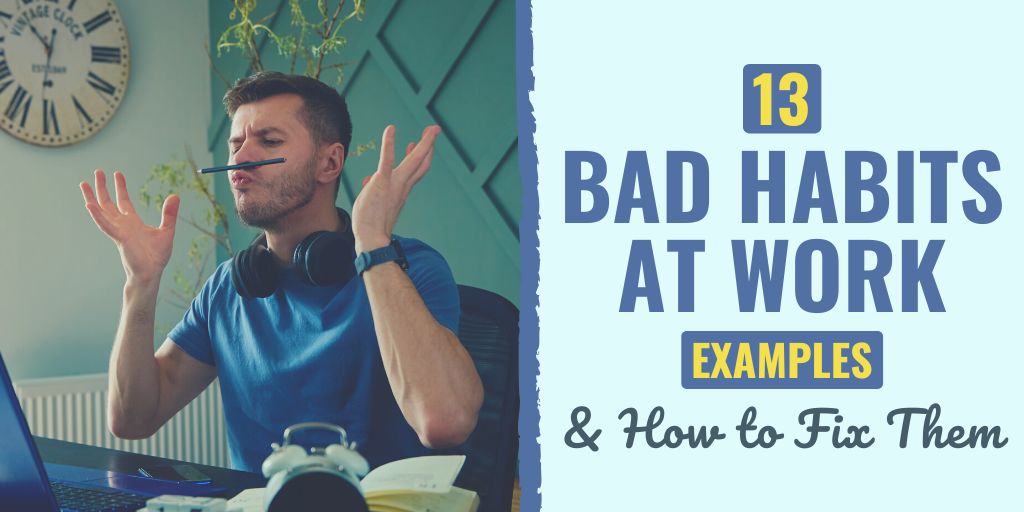There might be affiliate links on this page, which means we get a small commission of anything you buy. As an Amazon Associate we earn from qualifying purchases. Please do your own research before making any online purchase.
Oh, how I love the lockdown legacy: remote working. Where I had previously gotten up early, hit the gym, and then gone to work… I now laze in bed until the alarm has gone off several times, then drag my laptop closer just before the first morning meeting starts online. I have clearly lost a good work ethic. I’ve developed a few bad habits at work and the effects are damaging.
Let’s face it, work isn’t always the most soul-stirring activity to attend to. However, it’s so much more soul draining when you already have some bad and negative habits that bring you up short. Thing is, some of these habits may not even register as being bad in your book.
So let me share some examples of bad work habits and how to fix them.
How Do We Develop Bad Habits?
Bad habits are repetitive actions that we engage in which aren’t good for us. These habits are either destructive, reduce productivity, or lead to worse habits. We develop bad habits because there is some short-term payoff for these habits.
As with all habits, we start an action because it seems to work at alleviating a problem. The problem may be that you are bored at work, or you feel tired from the previous night, and the action brings you some rest. Your actions alleviate the symptoms of your problems, and therefore, you keep doing it.
Like someone who smokes because they feel stressed and nicotine temporarily boosts their feel-good state of mind, you start and continue a bad work habit because it seems to free you from a situation or place you don’t wish to be.
Habits can be learned at a young age, and these habits can then extend to your work life. An instance of this would be a child who never learned to work hard for rewards and continues delivering mediocre work as an adult.
Sometimes, the negative habit starts suddenly in response to an event or life transition. Covid, a divorce, or death in the family are examples of events that can trigger a negative habit. An example of this could be when you suddenly start to arrive late for work because you are depressed and don’t want to be where people ask you how you are.
[See a list of 31 Bad Habits You Should Get Rid of Today]
Negative Effect of Bad Work Habits
A bad work habit would be less significant if it didn’t have severe consequences, but it does. In the world of work, there are few second chances, and having bad work habits will not stand you in good stead.
If you work for an employer, bad work habits can end up getting you fired, while if you are an entrepreneur, you may end up struggling to make ends meet. Some other negative effects of bad work habits include:
Your colleagues also carry heavy workloads, and if you are slacking or not bringing your share, they will begin to lose respect for you. Respect, once lost, is hard to regain.
When you are known to be a bad worker, you will develop a bad reputation, which can have negative effects, such as having you passed over for promotions and not being considered a valuable team member.
If you are known to have bad work habits, chances are you will be passed over for promotions, and as a result, your earnings will drop, leading to a lower income.
Not only will a poor work ethic and bad work habits lead to people not respecting you, but it will also lead to you no longer respecting yourself. Your character will be influenced, and what may have started as one bad work habit can multiply into many.
It may seem like a stretch, but a bad work habit can easily give way to more corrupt and morally reprehensible actions like stealing or acting in unethical ways. After all, each criminal who stole from their place of employment had one pivotal moment when they transitioned from a bad habit to a crime. Poor work habits are then the gateway to worse behavior and more dire repercussions.
13 Bad Work Habits
There are many different work habits that can be considered bad. While you may try to justify bad habits, these are not constructive or useful to you or your employer.
Here are some bad work habits that you should be on the alert for:
Bad Habit #1. Captain Procrastination
“I’ll get to it eventually!”
If you don’t know when to do something and can’t stick to goals because you self-doubt and struggle to get things done, you’re a captain procrastinator. Procrastination is often the result of faulty reasoning and poor justification.
You don’t mean not to be productive. It’s just that things happen and get in the way of that meeting or prevent you from getting a presentation ready on time, right? But why is it that others get stuff done? Don’t they face their own challenges, but how are they on point?
Being productive is a choice, and procrastinating is a choice too. You are choosing poorly.
Why This Is a Bad Habit: Procrastination is directly correlated to a drop in productivity, and it opens the way for other negative work habits.
Breaking the Habit: Plan in small bites. Procrastinators see the big picture and secretly doubt they can do it. When you have a small bite on your work fork, you will be able to swallow it much easier and get stuff done.
Bad Habit #2. Too Many Breaks
When you develop the bad habit of taking too many breaks at work or being easily distracted, you also become extremely unfocused and unproductive. It makes you undependable to your colleagues, because when they need you, you are away on a break.
Why This Is a Bad Habit: Your lack of effort and frequent absences set a bad example to other employees. If you work for yourself, you will only put in about 50-60% of the effort you should.
Breaking the Habit: If you frequently take breaks, you should own up and keep track. Schedule a few short breaks during the day, and don’t allow yourself the right to take more breaks. When you start to keep score of the breaks, you will begin to realize just how lax you’ve been.

Bad Habit #3. Poorly Organized
Oddly, being organized is something that is also a habit. When you are a habitually disorganized worker, you will lack the ability to keep track of tasks and information, which will negatively affect not only your own performance, but also the quality of your team’s work.
Why This Is a Bad Habit: Disorganized workers make for mentally unfocused people. Lacking organization will lead to your life becoming chaotic at work and at home.
Breaking the Habit: Start small. Get a day planner, make notes, and take yourself to task when you don’t have things in a specified order. We all have different filing systems; keep yours simple (and don’t slack when planning).
Bad Habit #4. You Don’t Communicate
While you don’t have to be chatty, a work environment (whether in the office or remote) requires that team members communicate. If you don’t communicate timely because you don’t want to talk to people, you jeopardize the project or team.
Why This Is a Bad Habit: Being a good communicator is a requirement for an effective team player, so it makes you a valuable team member.
Breaking the Habit: If you are really bad at updating your colleagues, set yourself checkpoints where you have to update everyone.
Bad Habit #5. Entrenched in Work
Perhaps you feel really comfortable with what you’re doing. Nothing wrong with that, right? However, it can lead to being inflexible and not embracing change.
Why This Is a Bad Habit: Change is important for your growth in work and in your career. Not wanting to change leads to professional stagnation.
Breaking the Habit: Each day, ask yourself what you can do differently than before.
Bad Habit #6. Always Late
Being late is NEVER fashionable. It’s a sign of demotivation, disorganization, and laziness. Although there are definitely good excuses for missing work or tardiness, no matter what’s going on in your life, being late for work repeatedly is never acceptable.
Why This Is a Bad Habit: Chances are you’ll get fired for being late all the time.
Breaking the Habit: If you simply can’t stick to time, set your watch a bit earlier so you are always running ahead of time. An extra 45 minutes to cushion your day will do wonders. Try getting a healthy morning routine going.
Bad Habit #7. Dead on Deadlines
A deadline shouldn’t be a “dreadline,” but if you are constantly missing the mark and not being on time with work, you are in trouble.
Why This Is a Bad Habit: Deadlines are there to ensure the company you work for meets its mark, makes a profit, and can pay your (and everyone else’s) salaries, so missing deadlines the whole time is not good for the company or your fellow employees.
Breaking the Habit: This is another case of being bad at time management, so if a project is due on a Monday, ensure you have it ready by the Friday lunchtime—no excuses.
Bad Habit #8. As Easily Distracted as a Goldfish
Work requires that you focus. Yet we live in a world where there are loads of distractions, most notably social media, chat apps, and more. A few digital notifications and you’re completely distracted. It takes several minutes after each email you answer or each text message you reply to for your brain to reach optimal efficiency again.
Why This Is a Bad Habit: Being unproductive because of social media and employees chatting at your desk is why some companies don’t allow either during work hours. Distraction leads to poor quality work.
Breaking the Habit: If you have FOMO, you may want to switch off your phone, silence your notifications, and work in a closed office (if you can) to avoid distraction.

Bad Habit #9. You’re a Negative Nate
Negativity is not only a feeling—it’s also a habit. When you are constantly being negative about everything at work, you sour the workplace atmosphere, which also creates a depressive cascade that lowers everyone’s performance.
Why This Is a Bad Habit: Negativity cuts down on creativity and problem solving, which leads to lower productivity.
Breaking the Habit: A snap band can work wonders. Place a regular elastic band on your wrist, and each time you have a negative thought or make a negative comment, snap yourself. The small pain will remind you that being negative is bad.
Bad Habit #10. Overplanning
While this may seem to be a type of procrastination, overplanning is also about not knowing your own limits. An over planner is constantly adding more things they want to do, planning to fit a 30-hour day into 24 hours.
Why This Is a Bad Habit: Overplanning usually stacks the deck against you. Instead of getting more done, you end up fighting a losing battle against illogical deadlines. Talk about a serious demotivation! This also affects your colleagues, who often have to step up to do the things you simply can’t get to.
Breaking the Habit: If you tend to over plan, it’s very useful to have a good friend or colleague check your planning for the day or week. They will quickly tell you that you’re being unrealistic in what you plan to do.
Checking back on planners you’ve used in the past where you indicate what worked and what didn’t will also help you plan more successfully and realistically.
Bad Habit #11. Not Taking Breaks
The other end of the “taking too many breaks” spectrum is not taking enough breaks. Overworking yourself can lead to mental fatigue and physical breakdowns. Worse, if you are a manager, you may expect your employees to also work as tirelessly as you do, which will create resentment and antagonism in your workforce.
Why This Is a Bad Habit: It’s not great for productivity to overwork and not take breaks. Productivity also drops as you become less effective due to mental strain and physical exhaustion.
Breaking the Habit: Use a time tracking app to remind yourself you need to get up, walk around, hydrate, and stretch muscles. Once you return, you will be much more productive.
Bad Habit #12. Not Setting Goals
If you feel like you can’t achieve anything, you may choose never to set goals. While it may seem peaceful, you’re the proverbial duck paddling like mad under the calm lake. Goals help you stay on track and know what is expected of you with clarity and focus. It directs your efforts.
Why This Is a Bad Habit: Without goals, you’ll be extremely unproductive, and if you work in an industry where you collaborate with others or have to meet deadlines, your lack of goals will lead to serious repercussions like failed targets and missed deadlines.
Breaking the Habit: Set yourself a few big goals, marking them on a sticky note. When you have accomplished a goal, allow yourself to feel successful and proud. Now set more goals.
Bad Habit #13. Poor at Accepting Criticism
Working with others means you will get feedback, and often, this can seem like negativity and being hypercritical. How you accept criticism says a lot about you as a person and as a worker. Always believing you are being victimized is a bad habit that destroys your credit with colleagues.
Why This Is a Bad Habit: Criticism helps us grow, but when you refuse to accept criticism, your growth will fail. In the work environment, being good at accepting criticism helps you grow and develop.
Breaking the Habit: Start by keeping a journal where you write about your experiences with criticism. Never make a snap decision, but rather write down the criticism you receive and evaluate it coolly and calmly.
Final Thoughts on Bad Habits at Work
Bad work habits are often great at fooling us into believing we’re doing well when we really aren’t. At work, your bad habits not only cost you in terms of time, money, and esteem; it also costs your personal advancement and professional success.
Have you got a few bad habits that you pack in your daily briefcase? With bad habits, your chances at success are limited.
Work on being a responsible, time-conscious, and respectful adult… and create the goals and dreams that will guide you to feeling satisfied in your abilities and efforts. To learn more about how you can make good habits stick, read on.


